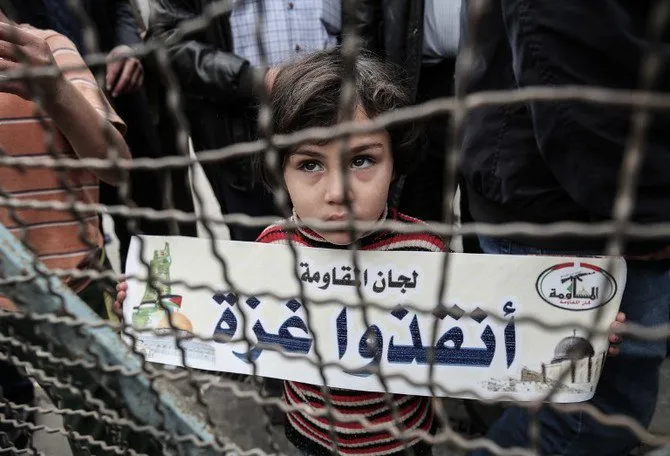Hiện nguồn quỹ cho các công tác này đã gần cạn và họ cần số tiền nhiều hơn khoản 350 triệu USD nhưng cần dựa trên thực tế.

Ảnh minh họa. Nguồn: Arabnews
Kế hoạch cứu trợ nhân đạo 2019 dự kiến có 203 dự án triển khai bởi 88 nhóm khác nhau cần thực hiện, bao gồm một số cơ quan của Mỹ và các tổ chức phi chính phủ.
Kế hoạch này nhắm đến việc hỗ trợ cho 1,4 triệu người dân Palestine đang có nhu cầu cấp bách về lương thực, chăm sóc sức khỏe, chỗ ở, nước sạch và vệ sinh, Jamie McGoldrick, điều phối viên nhân đạo của Mỹ ở Dải Gaza, Bờ Tây và Đông Jerusalem cho biết.
Hiện công tác cứu trợ nhân đạo đang đối mặt với nhiều thách thức, bao gồm sự sụt giảm kỷ lục nguồn kinh phí và hàng loạt vụ tấn công nhắm vào các đoàn cứu trợ.
Từ cách đây vài năm, Mỹ đã cắt giảm bớt kinh phí cứu trợ cho Palestine, trong đó gồm cả khoản cứu trợ chi cho một cơ quan để phục vụ 5 triệu người tị nạn Palestine.
Năm 2018, Mỹ hứa cấp 365 triệu USD cho cơ quan cứu trợ nhân đạo này nhưng mới chỉ chi 60 triệu đầu tiên, trước khi có thông báo hồi tháng Tám rằng sẽ dừng tất cả các khoản đóng góp trong tương lai.
Động thái này được xem như là một cách thức buộc Palestine phải bước vào bàn đàm phán với Israel.
Khoảng 77% số tiền huy động cho kế hoạch của năm 2019 sẽ được chuyển đến Gaza, là nơi đang trong tình trạng tồi tệ do bị phong tỏa nhiều năm liền bởi Israel và các nhóm chính trị nội bộ Palestine cùng với hàng loạt cuộc biểu tình và chiến sự tiếp diễn.
U.N., Palestinians launch humanitarian appeal after funding cuts
(Reuters) - The United Nations and the Palestinian Authority on Monday appealed for $350 million in humanitarian relief for Palestinians next year, saying that they needed more but had to be realistic in the face of "record-low" funding.
The 2019 Humanitarian Response Plan outlined 203 projects to be carried out by 88 different groups, including U.N. agencies and non-governmental organizations.
The plan prioritized 1.4 million Palestinians most in need of food, healthcare, shelter, water and sanitation, said Jamie McGoldrick, the U.N. humanitarian coordinator in the Gaza Strip, West Bank and East Jerusalem.
"Humanitarian actors are facing unprecedented challenges, including record-low funding and a rise in attacks to delegitimize humanitarian action," he said in a joint statement issued on Monday, ahead of the appeal's launch in Ramallah in the Israeli-occupied West Bank.
Although "much more assistance is needed", McGoldrick said, the plan was "reflecting what we can realistically accomplish in this highly constrained context".
Over the past year, the United States has slashed its funding to the Palestinians, including to the U.N. agency that provides services to 5 million Palestinian refugees.
The United States promised $365 million to the agency in 2018, but paid only a first installment of $60 million before announcing in August that it would halt all future donations.
The move was widely seen as a means of pressuring the Palestinian leadership to enter peace negotiations with Israel.
The Palestinians want to establish a state in the West Bank, Gaza and East Jerusalem - territories that Israel captured and occupied in the 1967 Middle East war.
U.S.-brokered peace talks between the sides collapsed in 2014 and a bid by U.S. President Donald Trump to restart them has so far showed little progress.
Around 77 percent of the funds sought in the 2019 plan would go to Gaza, the appeal organizers said, because the densely populated coastal strip faced a "dire humanitarian situation" after years of an Israeli-led blockade, internal Palestinian political divisions and casualties from demonstrations and recurring hostilities.
"The humanitarian context in the oPt (Occupied Palestinian Territories) is still deteriorating due to the Israeli occupation violations in a time of lack of resources and declining funds because of the politicization of the humanitarian aid,” Palestinian Social Development Minister Ibrahim Al-Shaer said in the statement.
